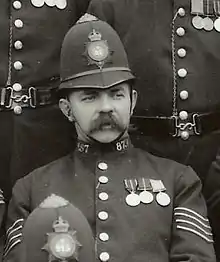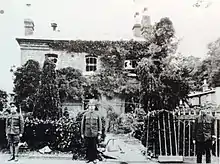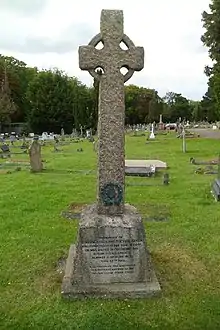Epsom riot
The Epsom riot occurred when about 400 Canadian soldiers rioted and attacked the police station at Epsom, Surrey on 17 June 1919, resulting in the death of Station-Sergeant Thomas Green, a British police officer, who died of his injuries the following day.[1][2]

The riot
In the summer of 1919, the First World War had been over for over half a year, but many of the British Empire's soldiers still had not been sent home. Unhappy at the delay in being returned to Canada, the men of some Canadian regiments stationed at Woodcote Camp on Epsom Downs became increasingly restive.
On 16 June 1919, Derby Day, a number of the men were at The Rifleman pub and began flirting with the wives of the locals. A minor fight broke out and two of their number, Canadian Privates MacDonald and Veinotte, were arrested.
On 17 June, about 20 of their friends gathered outside the police station in Ashley Road demanding their release, while sending word back to other soldiers at the camp to come down to the town to assist them. About 400 Canadian soldiers gathered; in time, they attacked the police station, intending to release MacDonald and Veinotte. Thereafter, the 400 soldiers ran riot through Epsom, breaking windows and destroying property in a trail of destruction more than a mile and a half long.[3]
When the rioters stormed the police station, it was defended by 16 police officers armed with wooden truncheons. During the ensuing fighting 11 policemen were injured, and Sergeant Thomas Green, aged 51, was fatally wounded when he was hit on the head with an iron bar. He died in Epsom Hospital the next day without having regained consciousness.[3]

Scotland Yard detectives arrested Allan McMaster, 30, a former blacksmith, whom they believed to be the rioters' leader. However, the Canadian soldiers refused to identify him. Despite this, McMaster and seven other soldiers were put on trial at Guildford in July, accused of rioting and manslaughter. Mr Justice Darling presided. The accused were: James Connors, 19, private, 13th Canadian Highlanders; Robert Alexander McAllan, 45, C.A.M.C.; Allan McMaster, 30, private, 3rd Canadians; Alphonse Masse, 27, C.A.M.C.; Gervase Porier, 24 C.A.M.C.; Herbert Tait, 29, gunner, 11th Division Canadians; Frank Harold Wilkie, 21, private, 102nd Battalion Canadians, and David Verex, 32, private, Canadian Forestry Corps.[4] The prosecution, which included Cecil Whiteley KC, presented a case which was so ineffectual that the four accused were quickly acquitted of manslaughter, and were found guilty only of rioting. They were sentenced to 12 months imprisonment. Within weeks they were pardoned by the Prince of Wales and returned to Canada.[3]
Back in Canada, McMaster confessed to the murder of Sergeant Green in 1929, and was detained by the Canadian police, but he was released after Scotland Yard said he had been legally dealt with by the Guildford court in relation to Green's death. This left the case officially unsolved. In 2010, We Are Not Manslaughterers by Martin Knight was published. The book contended the mysterious death of a Canadian soldier in Epsom days after that of Sgt. Green was a revenge killing.[5]
Police Roll of Honour
The Police Roll of Honour Trust records the death of Sergeant Green as a death in the line of duty.[6]
100th Anniversary

In June 2019 commemorations occurred in remembrance of Sergeant Green, both at The Rifleman and at Epsom Cemetery, where Green is buried.[7] In a small ceremony at the Epsom Town Hall, Green's great-grandson, David Kirkham, donated Sgt. Green's service medals so they can be put on display at the local museum.[7] On the centenary, 17 June 2019, Ashley Road Cemetery and Epsom Methodist Church hosted memorial events.[8] Kirkham states that "I would hope that he'd be proud that people have kept the memory alive, that he wasn't forgotten."[7]
References
- The Epsom Advertiser incorporating the Epsom Observer, 25 July 1919.
- Jack Knox: When 400 rioting Canadian soldiers killed a British policeman
- Gone But Not Forgotten Archived 2 December 2010 at the Wayback Machine, truecrimelibrary.com; accessed 21 November 2017.
- The Epsom Riot - A Parade at Bow Street - Canadian Sent For Trial, The Epsom Advertiser incorporating the Epsom Observer, 4 July 1919.
- Martin Knight (2010). We Are Not Manslaughterers. ISBN 978-1-907183-14-0.
- "Thomas Green". Police Roll of Honour Trust. Retrieved 18 June 2019.
- "A 'stain on the fair name of our soldiers': Remembering a Canadian riot that turned deadly in England in 1919". CBC. 17 June 2019. Retrieved 29 December 2020.
- The Epsom Riot: The story of one of Britain's forgotten police tragedies
External links
- The Epsom Riot in The National Archives
- The Epsom Advertiser incorporating the Epsom Observer 27 June 1919
- The Epsom Advertiser incorporating the Epsom Observer 4 July 1919
- 'Assault on precinct Epsom'
- Sergeant Thomas Green remembered in the Metropolitan Police Book of Remembrance